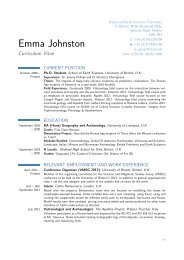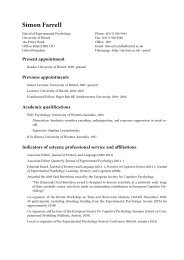What is Scientific Progress?
What is Scientific Progress?
What is Scientific Progress?
You also want an ePaper? Increase the reach of your titles
YUMPU automatically turns print PDFs into web optimized ePapers that Google loves.
1 C.f. the motto to Franc<strong>is</strong> Bacon’s New Organon “multi pertransibunt et augebitur scientia” (“many shall go about and<br />
knowledge shall increase”) and Sir William Bragg: “If we give to the term <strong>Progress</strong> in Science the meaning which <strong>is</strong><br />
most simple and direct, we shall suppose it to refer to the growth of our knowledge of the world in which we live.”<br />
(Bragg 1936; 41)<br />
2 I do not w<strong>is</strong>h to rule out the possibility that ep<strong>is</strong>temic concepts might ultimately be defined in terms of semantic ones.<br />
Nonetheless, I intend my argument to support Williamson’s view (2000) that knowledge <strong>is</strong> the central ep<strong>is</strong>temic<br />
concept and does not have an analys<strong>is</strong>.<br />
3 Niiniluoto briefly d<strong>is</strong>cusses the cumulative truth view (Niiniluoto 1984,76-7). He says the view <strong>is</strong> “nowadays widely<br />
regarded as giving a naïve and oversimplified picture of the development of science.” He rejects the view because,<br />
among other reasons, it cannot, he says, accommodate strictly false theories that are nonetheless idealizations that are<br />
close to the truth. I reject th<strong>is</strong> reason below.<br />
4 Laudan (1977, 147) notes that several philosophers have promoted cumulative accounts of progress, including<br />
Whewell, Peirce, Duhem, Collingwood, Popper, Reichenbach, Lakatos, and Stegmüller. That an account of progress <strong>is</strong><br />
cumulative <strong>is</strong> cons<strong>is</strong>tent with its conforming to any of the ep<strong>is</strong>temic, semantic, or functional-internal. conceptions <strong>What</strong><br />
will vary among the cumulative versions of such views will be what <strong>is</strong> accumulated (knowledge, truth, or problem-<br />
solutions). But since knowledge <strong>is</strong> harder to come by and more difficult to shift once acquired, the problem of a<br />
corresponding loss will be rarer for the ep<strong>is</strong>temic conception than for the other conceptions.<br />
5 Others have chosen ver<strong>is</strong>imilitude for different sceptical reasons. Popper of course did not accept the pessim<strong>is</strong>tic<br />
induction. But h<strong>is</strong> inductive sceptic<strong>is</strong>m and h<strong>is</strong> conviction that theories have a zero probability of truth mean that he<br />
cannot think of progress either as accumulating knowledge or as accumulating truth.<br />
6 ‘Approximately p’ may be read as ‘it <strong>is</strong> approximately true that p’.<br />
7 C.f. footnote 6 above.<br />
8 As Bragg (1936, 41) states “The first purpose of scientific enquiry <strong>is</strong> to add to the extent and accuracy of our<br />
knowledge.” (My emphas<strong>is</strong>; c.f. footnote 1)<br />
9 So the proposition represented ‘c= Val(c+δ)’ where c=2.99793x10 8 ms −1 and δ=0.00002x10 8 ms −1 <strong>is</strong> to be read as<br />
‘c=2.99795x10 8 ms −1 ’.<br />
10 The real<strong>is</strong>t might in any case be able to accommodate a small number of peripheral and unusual counter-examples.<br />
39






